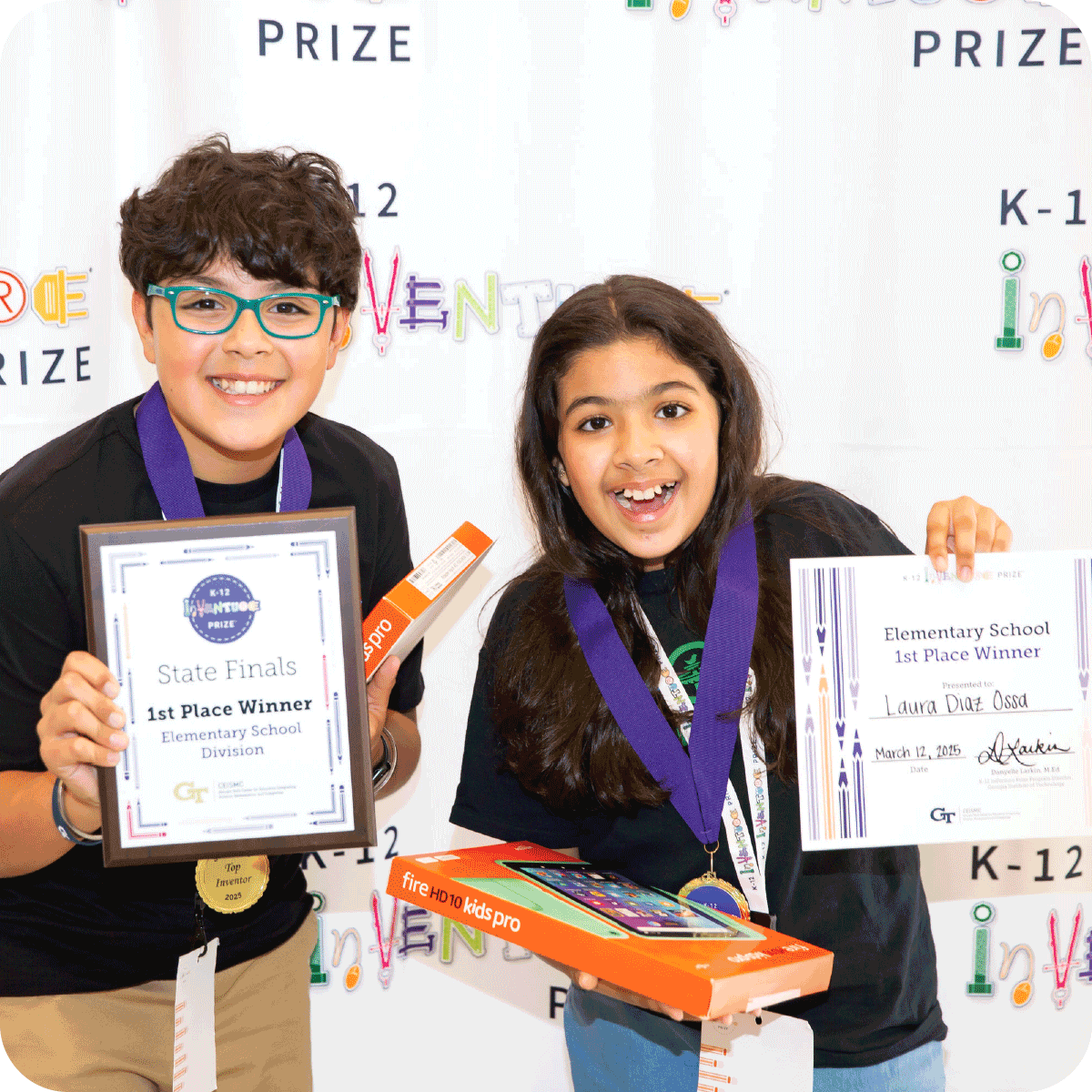
Invention Convention U.S. Nationals is a unique multi-day experience for students to present their inventions to educational and industry expert judges as well as other student inventors across the country.
A select number of winning teams from Georgia Tech’s K-12 InVenture Prize State Finals have been invited to represent the State of Georgia at the Raytheon Technologies Invention Convention U.S. Nationals June 4-6 in Dearborn, Michigan.
Invention Convention U.S. Nationals is a unique multi-day experience for students to present their inventions to educational and industry expert judges as well as other student inventors across the country. Hosted at the Henry Ford in Dearborn, Invention Convention U.S. Nationals invites student inventors to compete at the national level. An affiliate of Invention Convention Worldwide, K-12 InVenture Prize reserves a number of spots to invite select student teams from State Finals to represent Georgia at the U.S. Nationals competition. Qualifying inventions are eligible for industry awards, patent application awards, cash prizes, and scholarships.
“Competing on the national stage representing their state is another well-earned honor for our hard-working student inventors and their STEM teachers,” said Danyelle Larkin, director of the K-12 InVenture Prize program. “This is a potentially life-changing experience for our student inventors and a chance to truly discover their potential as they continue to refine their inventions and presentations. Many of our students go on to apply for patents and develop their ideas into working businesses. And select members of our team will also be traveling to nationals to work in the competition and cheer on our Georgia student inventors.”
The teams representing Georgia for this year’s competition are:
- The Cleanomatic Birdbath, Sope Creek Elementary School: Uses a simple drain system to make the chore of cleaning much easier.
- Micro Plant, Covington Murdock Elementary School: A mobile plastic recycling device that will take recyclable metals and plastics and turn them into plastic chips and metal ingots.
- PathScan, FCS Innovation Academy: A novel device that can detect cancers for a fraction of the cost of our current methods.
- Replacing Traditionally Manufactured AA6061 Aluminum with 3D-Printed AA6061 for Martian Rovers, McIntosh High School: The design uses 3D-printed AA6061 aluminum, which can cut rover costs by $1.5 billion per mission while maintaining strength and durability.
- Refuge Radar, Amana Academy: App allows the de-homed community to select a service they might need and see all the homeless shelters nearby with those services.
- Retract Eraser, Heard Elementary School: This handy eraser tool attaches to your pencil.
- Oral Detect, Atlanta International School: A toothbrush featuring biosensor detectors that detect bacterial colonies in the mouth.
- New Driver VR Simulator, Midtown High School: Uses VR simulation to help new drivers safely practice.
- Spectro Stroke, Innovation Academy: A minimized spectrophotometer that allows for accurate one-step measurements to be completed by patients to predict diseases like stroke that currently have no methods of prediction.
- Speuro: Kudzu Based Supramolecular Polymers for Neuroregenerative Therapy, Mcintosh High School: This targeted, patient specific, biodegradable, affordable, and efficient treatment can save lives, the environment, and encourage responsible use of our planet through introducing alternative materials in regenerative medicine.
- Aqua Seal, Midtown High School: A one-of-a-kind product designed to help trail runners and outdoor enthusiasts enjoy the great outdoors without getting wet socks or annoying pieces of debris in their shoes.
- M.D.S. (Missile Detection System), Thomasville YMCA: Will help other countries detect missiles and bombs.
- CPR (Chicken Poop Remover), Sunset Elementary: Simplifies the process of cleaning dirty chicken coops.
The K-12 InVenture Prize, based in the Center for Education Integrating Science, Mathematics, and Computing (CEISMC), challenges kindergarten through high school students to identify real-world problems and design novel solutions through analysis, creativity, and the engineering design process.
For more information on the K-12 InVenture Prize curriculum and competition, please visit https://k12inventure.gatech.edu or https://www.k12inventure.org.
—Randy Trammell, CEISMC Communications